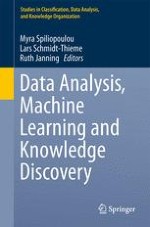2014 | OriginalPaper | Buchkapitel
ANOVA and Alternatives for Causal Inferences
verfasst von : Sonja Hahn
Erschienen in: Data Analysis, Machine Learning and Knowledge Discovery
Aktivieren Sie unsere intelligente Suche, um passende Fachinhalte oder Patente zu finden.
Wählen Sie Textabschnitte aus um mit Künstlicher Intelligenz passenden Patente zu finden. powered by
Markieren Sie Textabschnitte, um KI-gestützt weitere passende Inhalte zu finden. powered by
